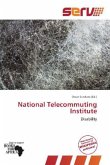Please note that the content of this book primarily consists of articles available from Wikipedia or other free sources online.Telecommuting, e-commuting, e-work, telework, working from home (WFH), or working at home (WAH) is a work arrangement in which employees enjoy flexibility in working location and hours. In other words, the daily commute to a central place of work is replaced by telecommunication links. Many work from home, while others, occasionally also referred to as nomad workers or web commuters utilize mobile telecommunications technology to work from coffee shops or myriad other locations. Telework is a broader term, referring to substituting telecommunications for any form of work-related travel, thereby eliminating the distance restrictions of telecommuting. All telecommuters are teleworkers but not all teleworkers are telecommuters. A frequently repeated motto is that "work is something you do, not something you travel to". A successful telecommuting program requires a management style which is based on results and not on close scrutiny of individual employees. This is referred to as management by objectives as opposed to management by observation. The terms telecommuting and telework were coined by Jack Nilles in 1973.








